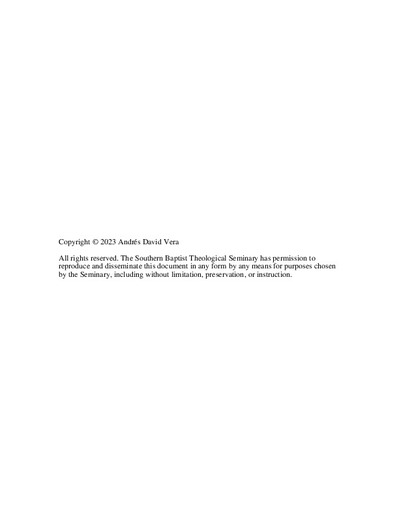| dc.description.abstract | This dissertation recognizes that in Romans 6:1–14, Paul responds to the “indicative-imperative” tension, which arises from his gospel in Romans 3–5. It then argues that Paul’s response to this tension comes in the form of a metaphorical narrative that constructs the believer’s new identity. This identity is presented conceptually in terms of existence in a new location, which inherently results in a believer’s new obligation. To defend my thesis, this dissertation analyzes Romans 6:1–14 by employing tools from cognitive linguistics (CL) and especially from conceptual metaphor theory (CMT).
Chapter 1 presents my research question, my thesis, and a preview of my overall argument. It also offers a brief survey of scholarship on the “indicative-imperative” schema. Chapter 2 lays out the methodology for the study by noting the benefits of a narrative reading of Paul and by offering a way of reading metaphors grounded on conceptual metaphor theory. My exegetical work begins in chapter 3, where I examine Paul’s figurative language in Romans 6:1–2. In these opening verses, Paul presents sin in spatial terms as a container. Chapter 4 examines Romans 6:3–4 and focuses on Paul’s literal, metaphorical, and metonymical baptismal language. I argue that his baptismal language is part of a larger metaphorical narrative focused on the believer’s identity.
In chapter 5, I consider Romans 6:5–10 and offer two main contributions. First, I show how Paul employs the Subject-Self metaphor to convey the complex dynamic of his self-understanding. Second, I demonstrate that Paul develops the metaphor SIN IS A CONTAINER into SIN IS A ΚΥΡΙΟΣ. This new metaphor allows Paul to speak more concretely about the believer’s sense of obligation as a matter of location (either in sin or in Christ). The last exegetical section comes in chapter 6, where I analyze Romans 6:11– 14, focusing on Paul’s imperatives. I show the significance of Paul’s Essential Self metaphor and conclude by tracing Paul’s conceptual logic in Romans 6 as he conceptualizes the believer’s new identity as one defined by a particular obligation. Chapter 7 summarizes my findings and offers possible avenues for further research. | en_US |

